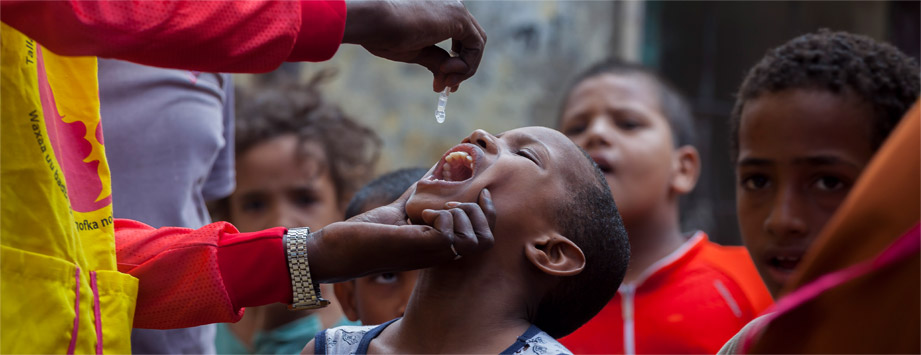Who we are
What we do
Conduct vaccination
In collaboration with health authorities and partners, we work to eradicate polio, primarily through the following actions: Respond to Polio Outbreaks by conducting vaccination campaigns. The last outbreak of wild poliovirus in Somalia was in 2014. However, since December 2017, two concurrent outbreaks of circulating vaccine-derived polio virus (cVDPV) have occurred, resulting in the detection of 19 children with paralysis. In order to interrupt the spread of polio virus and avoid additional infections and disabilities in vulnerable Somali children, we conduct nationwide and smaller, case- response immunization campaigns that aim to reach every child to boost their immunity. Maintaining a high level of immunity in the entire population, including mobile populations and across borders, is essential to prevent future outbreaks.
Detect acute flaccid paralysis
We search for acute flaccid paralysis in children under 15 years to ensure that, if found, no cases of poliovirus spread any further. Polio teams visit health facilities included in the active surveillance network (793 of 1267 health facilities). As part of passive surveillance, polio teams also liaise with focal persons in 413 other health facilities to report (zero reporting) on any suspected cases. Village polio volunteers support house-to-house surveillance in hard-to-reach and insecure areas.
Detect polioviruses in the environment
We complement surveillance of acute flaccid paralysis by searching for polioviruses in the environment. Samples are collected from sewer systems at four sites in Banadir region, and analysed at the Kenya Medical Research Institute in Nairobi. This surveillance helps signal whether people are infected and are shedding virus in their stool.
Build capacity
We develop the capacity of field staff (including WHO, UNICEF and health ministry staff) in the areas of surveillance and outbreak response.
Support routine childhood immunization
We support routine immunization of children by sharing resources, such as staff, systems and infrastructure with country's EPI. We integrate activities during vaccination campaigns and help strengthen the capacity of the Somali EPI.
Raise awareness of immunization
We work with authorities, UNICEF and local media outlets to raise awareness of the benefits of vaccines and vaccination, the campaigns that are being conducted and vaccination schedules, and to encourage caregivers to vaccinate children. Health workers use Somali information, education and communication materials to raise awareness among caregivers. Manage information. We collect data from acute flaccid paralysis and disease surveillance, EPI and vaccination activities, and other work streams, including from partner agencies (such as mapping of internally displaced people from the International Organization for Migration). This information guides decision-making and allows us to assess the quality of work done across the country. We post the information collected and the high-quality maps produced on the website www.somaliapolio.org. Polio teams are progressively using real-time, electronic means of reporting for data management (Open Data Kit software).
Support other health interventions
We provide support to other health interventions by sharing resources and systems established by the polio eradication programme in the past 22 years. For example, our systems are used to improve surveillance for diseases (including measles) and outbreak control (such as cholera).



